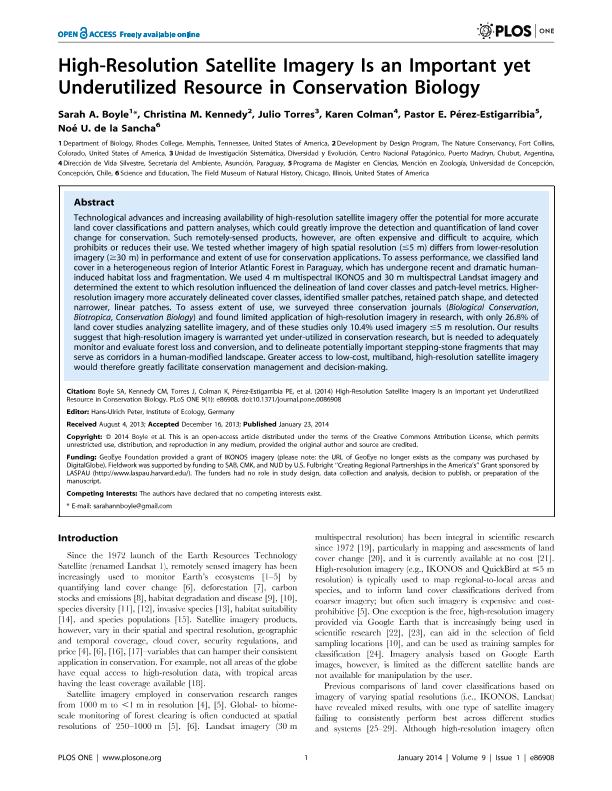Mostrar el registro sencillo del ítem
dc.contributor.author
Boyle, Sarah A.
dc.contributor.author
Kennedy, Christina M.
dc.contributor.author
Torres Monges, Julio Cesar

dc.contributor.author
Colman, Karen
dc.contributor.author
Pérez Estigarribia, Pastor E.
dc.contributor.author
de la Sancha, Noé U.
dc.date.available
2018-10-02T16:38:29Z
dc.date.issued
2014-01
dc.identifier.citation
Boyle, Sarah A.; Kennedy, Christina M.; Torres Monges, Julio Cesar; Colman, Karen; Pérez Estigarribia, Pastor E.; et al.; High-resolution satellite imagery is an important yet underutilized resource in conservation biology; Public Library of Science; Plos One; 9; 1; 1-2014; e86908
dc.identifier.issn
1932-6203
dc.identifier.uri
http://hdl.handle.net/11336/61513
dc.description.abstract
Technological advances and increasing availability of high-resolution satellite imagery offer the potential for more accurate land cover classifications and pattern analyses, which could greatly improve the detection and quantification of land cover change for conservation. Such remotely-sensed products, however, are often expensive and difficult to acquire, which prohibits or reduces their use. We tested whether imagery of high spatial resolution (≤5 m) differs from lower-resolution imagery (≥30 m) in performance and extent of use for conservation applications. To assess performance, we classified land cover in a heterogeneous region of Interior Atlantic Forest in Paraguay, which has undergone recent and dramatic human-induced habitat loss and fragmentation. We used 4 m multispectral IKONOS and 30 m multispectral Landsat imagery and determined the extent to which resolution influenced the delineation of land cover classes and patch-level metrics. Higher-resolution imagery more accurately delineated cover classes, identified smaller patches, retained patch shape, and detected narrower, linear patches. To assess extent of use, we surveyed three conservation journals (Biological Conservation, Biotropica, Conservation Biology) and found limited application of high-resolution imagery in research, with only 26.8% of land cover studies analyzing satellite imagery, and of these studies only 10.4% used imagery ≤5 m resolution. Our results suggest that high-resolution imagery is warranted yet under-utilized in conservation research, but is needed to adequately monitor and evaluate forest loss and conversion, and to delineate potentially important stepping-stone fragments that may serve as corridors in a human-modified landscape. Greater access to low-cost, multiband, high-resolution satellite imagery would therefore greatly facilitate conservation management and decision-making.
dc.format
application/pdf
dc.language.iso
eng
dc.publisher
Public Library of Science

dc.rights
info:eu-repo/semantics/openAccess
dc.rights.uri
https://creativecommons.org/licenses/by-nc-sa/2.5/ar/
dc.subject
Imagery
dc.subject
High Resolution
dc.subject
Atlantic Forest
dc.subject
Consevation
dc.subject.classification
Otras Ciencias Biológicas

dc.subject.classification
Ciencias Biológicas

dc.subject.classification
CIENCIAS NATURALES Y EXACTAS

dc.title
High-resolution satellite imagery is an important yet underutilized resource in conservation biology
dc.type
info:eu-repo/semantics/article
dc.type
info:ar-repo/semantics/artículo
dc.type
info:eu-repo/semantics/publishedVersion
dc.date.updated
2018-06-22T15:53:31Z
dc.journal.volume
9
dc.journal.number
1
dc.journal.pagination
e86908
dc.journal.pais
Estados Unidos

dc.journal.ciudad
San Francisco
dc.description.fil
Fil: Boyle, Sarah A.. Rhodes College; Estados Unidos
dc.description.fil
Fil: Kennedy, Christina M.. The Nature Conservancy; Estados Unidos
dc.description.fil
Fil: Torres Monges, Julio Cesar. Consejo Nacional de Investigaciones Científicas y Técnicas. Centro Nacional Patagónico; Argentina
dc.description.fil
Fil: Colman, Karen. Secretaría del Ambiente. Dirección de Vida Silvestre; Paraguay
dc.description.fil
Fil: Pérez Estigarribia, Pastor E.. Universidad de Concepción; Chile
dc.description.fil
Fil: de la Sancha, Noé U.. The Field Museum of Natural History; Estados Unidos
dc.journal.title
Plos One

dc.relation.alternativeid
info:eu-repo/semantics/altIdentifier/url/https://journals.plos.org/plosone/article?id=10.1371/journal.pone.0086908
dc.relation.alternativeid
info:eu-repo/semantics/altIdentifier/doi/http://dx.doi.org/10.1371/journal.pone.0086908
Archivos asociados
